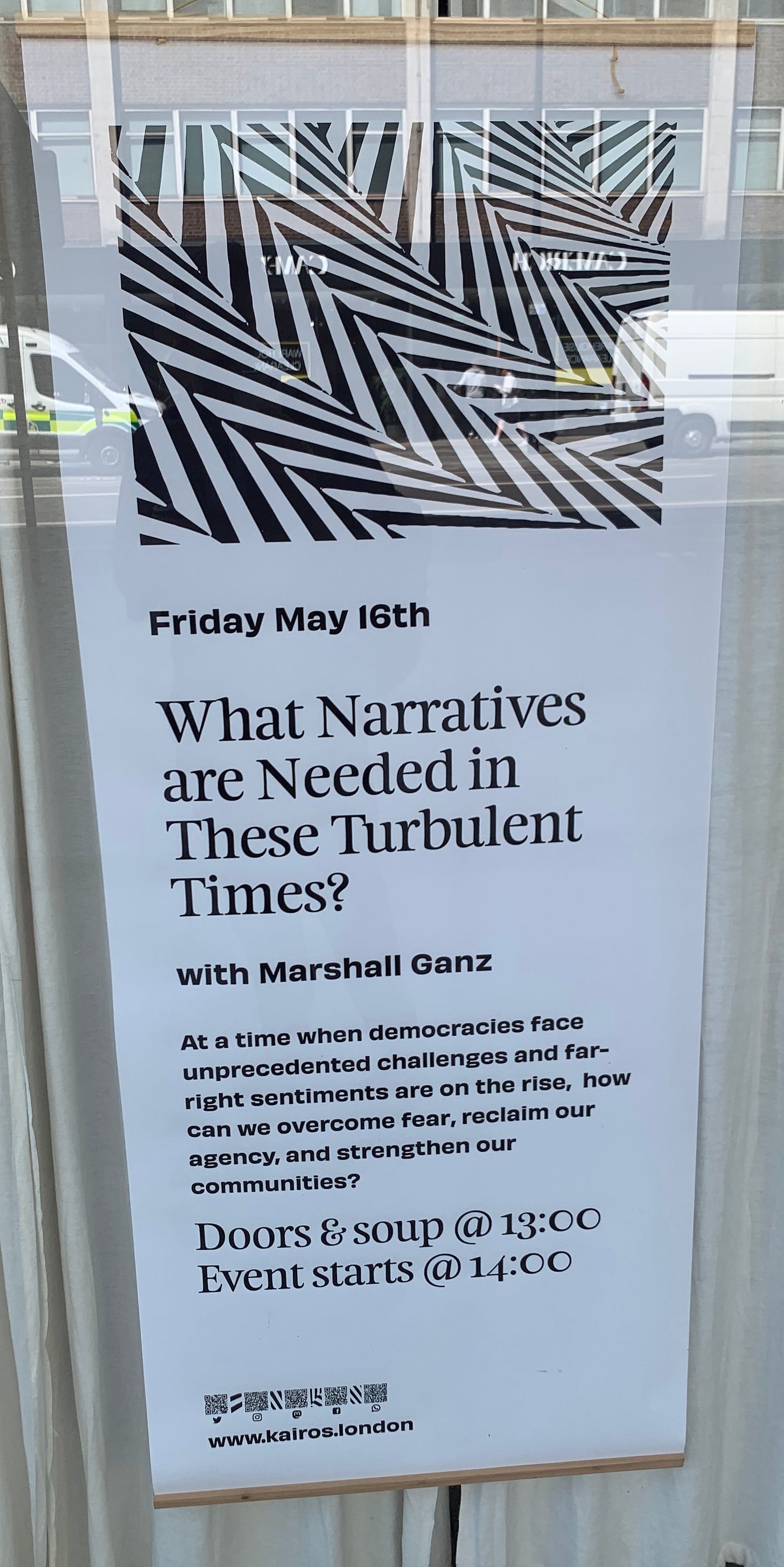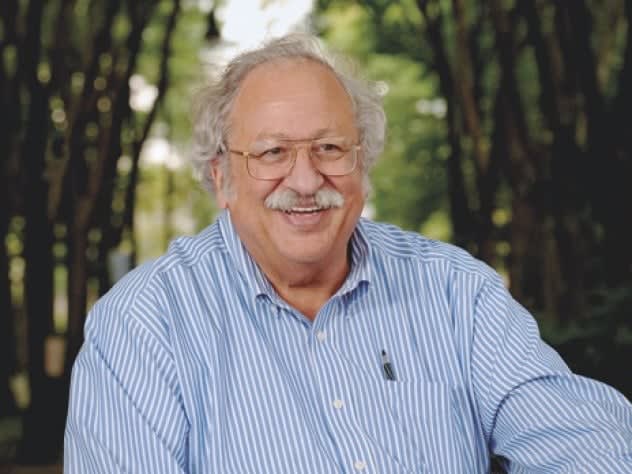Finding it and Feeling it
Stories, Memories, and Tears. Or, why do you care about what you care about?
Flirting with modernity will have to wait. It’s time to share something less conceptual about this whole ‘we need a new story’ malarkey.
Last Friday afternoon, I spent three hours at the event below at Kairos counter-club in central London.1

It was good to be out of the house, but I wasn’t entirely sure why I was there, and initially felt a bit bored by what felt like generic advice on familiar subjects that I had heard many times before. I showed up partly as a refugee claiming asylum from the enslavement of school pick-ups, and partly because I believe Woody Allen might be close to correct when he says that 80% of success in life can be attributed to “showing up”. Above all, though, I sensed there was something here I needed to learn or experience. While I am sceptical of the “we need a new story” outlook, I figured I should take the chance to hear from a legendary movement builder about narrative.
After all, Marshall Ganz has the shirt.

I found the question of the event: “What narratives are needed?” a bit misplaced, because I think it misrepresents our relationship to narrative. We cannot ask for a new narrative as if it is a request for an exogenous tool that we call for from outside of our context; as if they are hanging up on a rack in a work station, so that when we get lost under the bonnet, trying to fix the engine of modernity we say: The brakes don’t work, can you pass me some narratives about slowing down please?
I develop this point in a prior post called: We don’t need a new story: Why I am weary of calls for narrative change, where the signature line is probably this one:
By all means squeeze another story into the back of the car before you set off on your social change adventure, but you’ll find there’s a narrative traffic jam on the road to anywhere you want to go.
The issue is not just that stories are ubiquitous and entangled with each other. The deeper point is that our role is to create the narratives - they are not things we need, but patterns that we are and events that we are supposed to bring into being. Living legend of Bioregional governance, Joe Brewer, puts it well:
People ask me, what story would you tell for the new paradigm? And I tell them: You can’t tell a story that hasn’t happened yet. The way that we frame this story is by living it. We don’t create the story by telling it; we create it by living it.
That comes from a beautiful short video by Katie Teague:
And finally, in a recent conversation between Rachel Donald and Vanessa Andreotti, the inquiry begins with Rachel noticing how often this ‘new story’ panacea is proferred, and how inadequate it is, and Vanessa seems grateful for the question:
The simplistic thing about ‘let's just change the story’ is a huge problem. And maybe what needs to be born is a different way of story-ing as well, right?
That’s partly what Joe is saying, but Vanessa goes beyond the ‘be the story’ angle to highlight the risk of seeking new stories as “cognitive intellectual plotting” that keeps the world in its subject-object dualistic trance. Instead, she suggests, we need to look for subject-subject relations with and within the world and allow story-ing to emerge from that very different context and arena.
All of which is to say, my scepticism towards ‘new narrative’ and ‘new story’ might seem a bit crotchety, but it is not unfounded. So on Friday, while I was on my best behaviour and did not act like Commander-in-Chief of the folded arms brigade, I did feel like an outsider, and I wondered if the entire endeavour might be misplaced.
You know the feeling? You find yourself asking: Are these my people? I don’t think these are my people…
But then reality slaps you in the face, and tells you to get a grip.
Of course these are my people. You are their people, too. Stop trying to belong with your lame identity projects and pay attention to what is happening.
*
Perhaps not by chance, the teaching came alive for me in the last half an hour when it got to the connection between “the self story” and “the story of us”.
That sounds generic too, but there is a conceptual framework to situate that relationship. Ganz’s modus operandi stems from three questions of Hillel the Elder:
"If I am not for myself, who will be?
And if I am for myself alone, what am "I"?
And if not now, when?"
I first heard these lines about thirty years ago when I read an autobiography of former World Chess Champion Gary Kasparov by the poolside on a lads’ holiday in Tenerife, but Ganz relates these questions to "the story of self," "the story of us," and "the story of now." (The overlap with the threeness of the world did not escape my attention).
*
Ganz seemed to sense that the conversation needed a new intensity, and he asked us how many of us in the room felt they had a personal/professional calling. I was one of about 30% of the 100+ people in the room who put up their hand, but I put it down before he could ask me what I thought it was (as someone who has spent much of his adult life speaking in public, these days I am often relieved not to have to play that role, and prefer to blend into the background).
(If pressed, I think my calling is to write and speak about the relationship between the spiritual and the political with intellectual integrity, and help to establish what follows for cultural and institutional praxis…).
I was impressed by how Ganz probed for biographical and emotional rationale, even in a room where the network density was not high and many were strangers to each other. He asked people for personal memories and reasons, often forgotten, why they cared about what they profess to care about.
The details are private to the room, but for the people responding, the stakes were high. You could feel it. The result, for me at least, was a profound shared experience. When Ganz says ‘story of self’, I thought he was talking about identity and opinion, but he’s really asking about what moves us, perhaps even what makes us cry. These feelings can often be traced through memory. Ganz is saying, and I checked this with him when we briefly met later, that to really connect self and other, we need to allow ourselves and each other to reach our emotional bedrocks. Our calling can often only be discerned if we allow ourselves to go to the places that need no further explanation, the places hiding within the part of the self that speaks for itself through its silence, the wobble of its lips, and the production of its tears.
For me, no doubt that relates to the mental illness of my brother and father, the separation of my parents, being diabetic since I was six, and the role of chess in helping to forge identity. It’s a whole life, and a lot to explain, but it’s there for me, and that kind of portfolio of influences and experiences is there for everyone.
So the probing, Ganz’s tenacious questioning about why we care about what we care about, raised the event to spiritual heights. He was trying to help social campaigners of all kinds find the places within themselves where they can connect more deeply with each other.
Observing this made me see “new story” in a new light, and reminded me of Carl Rogers’ profoundly important line:
What is most personal is most universal.
Forgive me, but I am just so tired of individualism being demonised. It’s not that it’s always wrong, but it often overreaches. Yes, a fixation with the individual in denial of our interdependence and to the detriment of community is a problem, but that’s just scratching the surface. We have to protect and fight for the beautiful uniqueness of each and all of us, and indeed every living thing. Without such attention to variety and particularity, there is no sacred. The sacred lies in the revelation of the uniqueness forged through interdependence, and delighting in the imagination of the creative force and forces that forged us all.
So that’s the rub for today. We have to find it and feel it. We have to know who we are by clarifying what we care about and why. This is not lame chatter about shared values - that can go and jump in the lake. We have to allow ourselves to trust our intuitions and seek guidance too, but take the time we need to feel what we have to feel.
It’s not easy. It’s not obvious. But it’s the work. We may require others to help us get there, but when we succeed in doing it, we are likely to find our tears.
Only then are we ready for ourselves, ready for each other, and ready for now.
And only then can the stories that we are, that we need, that we are becoming, be told.
Kairos is a wonderful events space in central London, founded in 2022 and directed by Zoe Blackler. I have spoken there a couple of times and hope to again soon. There is a strict no phone/photo/recording policy at the venue, so while I would love to share some of their posters and the excellent quotations in the loo, I am not allowed to. I can, however, share that one of their rules is that anyone showing a consistent lack of imagination will be thrown out!




Thank you for bringing alive a rich and surprising evening and being willing to say how you were caught in those universally familiar personal traps of 'I know what this is' and 'it's not me' and the tendency to reject what seems 'other' and then the possibility of nevertheless continuing to listen and be open and what can then occur... It sounds a delightful and illuminating evening
For me it is less about story telling, than learning to listen deeply, profoundly, past all the noise and urgency to hear something deeper, truer and older. And to learn how we might learn to harmonise with whatever it is we hear.
That’s my narrative.
And I’m sticking with it!
Perhaps the story is only apparent when we look back. And then we call it wisdom and try to re-live it, out of time…